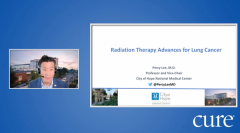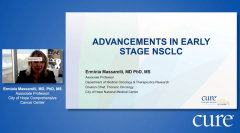
Educated Patient® Lung Cancer Summit Radiation Advances Presentation: April 29, 2023
Watch Dr. Percy Lee, from City of Hope, discuss radiation advances during the CURE® Educated Patient® Lung Cancer Summit.
Episodes in this series

Advancements made in the use of radiation therapy to treat lung cancer have allowed patients to undergo safer treatment and potentially live longer, with more progress on the horizon, one expert said.
Dr. Percy Lee, vice chair of clinical research at City of Hope in Duarte, California, and medical director of Orange County Coastal Radiation Oncology in Santa Ana, presented information on this area during the CURE® Educated Patient® Lung Cancer Summit.
CURE also spoke with Lee to learn more about why these advancements are important and how they have dramatically changed the radiation oncology space for patients with lung cancer.
“Advances have already been made that makes radiation safer, have less side effects and have efficacy for all four stages of lung cancer,” he told CURE. “Emerging technologies, such as MRI-guided radiation therapy, will hopefully further build upon those successes and further improve our outcomes in lung cancer.”
Even with this progress, Lee said that there is more to come for patients with lung cancer to benefit from.
“Although we made good strides, I think there’s a lot of room to still improve,” he said. “Working with colleagues in surgery and medical oncology, as a team, we are able to continue to make progress.”
Radiation Therapy and Sparing Healthy Tissue
Lee added that radiation is somewhat overlooked in the treatment of cancer in general. This may be because there is a lack of understanding of what radiation is and the overall fear of radiation as a harmful treatment option. But this may pose an opportunity for patients to learn about a treatment that is part of multidisciplinary care for patients with lung cancer.
“Part of my job is to educate the public and the patients that the way that radiation is delivered is very precise, focal and targeted to what we need to treat (patients and) being able to really spare healthy tissue,” he explained.
Despite these advances, patients with lung cancer may still experience some side effects, but “they have been significantly minimized in this modern era of radiation therapy,” Lee added.
The side effects of radiation therapy that patients may have include esophagitis (inflammation of the esophagus), which can cause pain when swallowing or eating; radiation pneumonitis (inflammation of the lungs), which can lead to worsening shortness of breath and cough; fatigue; and skin-related reactions to treatment. Lee said that most of these side effects are self-resolving.
Radiation Therapy for Several Lung Cancer Stages
A cancer team may be able to use radiation therapy for the treatment of nearly all four stages of lung cancer, Lee mentioned. For example, patients with stage 1 lung cancer may be treated with radiation therapy, which could replace surgery.
“Surgery is still sort of the golden standard for patients with stage 1 or early-stage lung cancer,” Lee said. “However, the outcomes of radiation, specifically stereotactic body radiation therapy, which is another kind of a form of high-dose (radiation), but few treatments, ablative radiation using advanced technology has really shown excellent outcomes in medically inoperable or patients who are too frail to undergo surgery and is currently being investigated for operable patients as well. It’s exciting that a nonoperative treatment could be as good as surgery.”
Radiation therapy is used in patients with stage 2 or 3 lung cancer as a component of a multidisciplinary treatment which also includes chemotherapy, followed by immunotherapy or a checkpoint inhibitor. In contrast, patients with stage 4 lung cancer may undergo radiation therapy for palliative care to potentially relieve pain for disease that spread to bone, hemoptysis (or coughing up blood) or shortness of breath from a tumor compressing on the airway or a lung.
Lee mentioned that recent data have demonstrated that in some patients with limited metastases — or oligometastatic disease — meaning three or fewer sites of disease spread, adding radiation to therapy can improve disease control and may improve survival in patients with stage 4 lung cancer.
Multidisciplinary Team Approach
Radiation oncologists are part of the oncology team and participate in multidisciplinary decision making regarding a comprehensive and holistic treatment plan, Lee said.
“Some people may think of us as more like technicians, but we’re not; we’re fully engaged in understanding all treatments and how we would add value including radiation therapy,” he added.
When seeking care from radiation oncologists, Lee advised patients with lung cancer to ask whether the radiologists on their team are experts in treating lung cancer, the type of technology they have at the center and whether it can be considered state of the art.
He also encouraged patients to seek expert opinions and potentially second opinions when deciding upon treatment options.
“Not just (with) radiation, but with targeted therapy, a lot of nuances in what are the first round of treatment, and that used to be just chemotherapy, but now, it's a complex decision determined by the molecular testing of their cancer, there's different subtypes,” Lee explained. “Don’t rush into treatment. … Seek expert opinion, people that specialize in lung cancer, and that may be worth waiting a couple of days or a week to seek that opinion. I'm not saying that it's not urgent to treat lung cancer, but I think sometimes patients get anxious, and they just want to get started on therapy before getting the right opinion with treatment.”
For more news on cancer updates, research and education, don’t forget to














